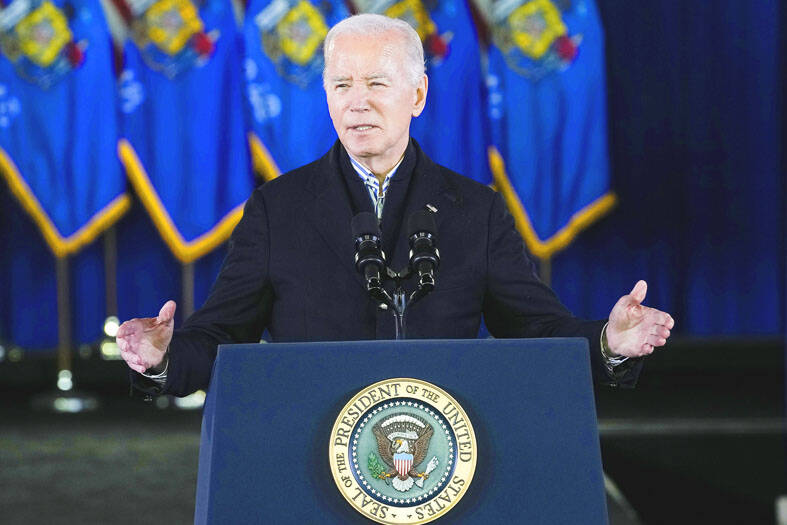US President Joe Biden on Friday signed into law the National Defense Authorization Act (NDAA) for Fiscal Year 2024, which requires the US secretary of defense to create a training program for Taiwan’s military, and requires a status report on the delivery of defensive weapons and services that the US has agreed to sell to Taipei.
Provisions in the NDAA related to Taiwan include measures to help boost its defense capabilities, counter Chinese influence campaigns and support Taiwan’s participation in international organizations.
One of those provisions requires the defense secretary, in consultation with “appropriate officials in Taiwan,” to establish a comprehensive training, advising and institutional capacity-building program for Taiwanese military forces, consistent with the US’ Taiwan Enhanced Resilience Act.

Photo: AP
The NDAA also directs the US secretaries of defense and state to describe actions taken to carry out the program in their annual report to the US Congress.
Other sections in the NDAA require US officials to closely monitor deliveries of defense articles to US allies, including Taiwan, and to prevent delays.
The bill forbids committing more than 85 percent of the funds available to the assistant secretary of the navy for research, development and acquisition until a plan is submitted to provide Harpoon missiles to security partners.
It also requires a briefing on the status of US-provided security assistance to Taiwan before the remaining funds can be released.
Taiwan has committed to purchasing 400 land-launched Harpoon missiles from the US. It hopes to start taking delivery of them in 2026 and to have received all 400 by the end of 2028.
The NDAA requires that the secretaries of defense and state brief congressional committees on the status of US-provided security assistance to Taiwan no later than 180 days after the date of the law’s enactment.
Those reports must include a list of defense articles and services either committed to or planned to be provided to Taiwan, and the estimated delivery schedule for each of them.
Crucially, the NDAA stipulates that the briefing must also identify any defense article or service whose delivery has been delayed by more than three months and the actions taken to prevent delays or accelerate the delivery of such items.
The NDAA also directs the defense secretary to work with Taiwanese officials on cybersecurity activities aimed at defending military networks, infrastructure and systems to counter “malicious cyber activity” aimed at military installations.
It also calls for officials to provide an assessment of the economic impact a potential Chinese invasion would have and response scenarios, along with viable economic policy options that would “cause escalating impacts” on China’s economy “during the pre-conflict phase.”
Officials are also required to provide regular assessments of Chinese efforts to convince Pacific island nations that diplomatically recognize Taiwan to change their allegiance to Beijing.

ENDEAVOR MANTA: The ship is programmed to automatically return to its designated home port and would self-destruct if seized by another party The Endeavor Manta, Taiwan’s first military-specification uncrewed surface vehicle (USV) tailor-made to operate in the Taiwan Strait in a bid to bolster the nation’s asymmetric combat capabilities made its first appearance at Kaohsiung’s Singda Harbor yesterday. Taking inspiration from Ukraine’s navy, which is using USVs to force Russia’s Black Sea fleet to take shelter within its own ports, CSBC Taiwan (台灣國際造船) established a research and development unit on USVs last year, CSBC chairman Huang Cheng-hung (黃正弘) said. With the exception of the satellite guidance system and the outboard motors — which were purchased from foreign companies that were not affiliated with Chinese-funded

PERMIT REVOKED: The influencer at a news conference said the National Immigration Agency was infringing on human rights and persecuting Chinese spouses Chinese influencer “Yaya in Taiwan” (亞亞在台灣) yesterday evening voluntarily left Taiwan, despite saying yesterday morning that she had “no intention” of leaving after her residence permit was revoked over her comments on Taiwan being “unified” with China by military force. The Ministry of the Interior yesterday had said that it could forcibly deport the influencer at midnight, but was considering taking a more flexible approach and beginning procedures this morning. The influencer, whose given name is Liu Zhenya (劉振亞), departed on a 8:45pm flight from Taipei International Airport (Songshan airport) to Fuzhou, China. Liu held a news conference at the airport at 7pm,

GRIDLOCK: The National Fire Agency’s Special Search and Rescue team is on standby to travel to the countries to help out with the rescue effort A powerful earthquake rocked Myanmar and neighboring Thailand yesterday, killing at least three people in Bangkok and burying dozens when a high-rise building under construction collapsed. Footage shared on social media from Myanmar’s second-largest city showed widespread destruction, raising fears that many were trapped under the rubble or killed. The magnitude 7.7 earthquake, with an epicenter near Mandalay in Myanmar, struck at midday and was followed by a strong magnitude 6.4 aftershock. The extent of death, injury and destruction — especially in Myanmar, which is embroiled in a civil war and where information is tightly controlled at the best of times —

Taiwan was ranked the fourth-safest country in the world with a score of 82.9, trailing only Andorra, the United Arab Emirates and Qatar in Numbeo’s Safety Index by Country report. Taiwan’s score improved by 0.1 points compared with last year’s mid-year report, which had Taiwan fourth with a score of 82.8. However, both scores were lower than in last year’s first review, when Taiwan scored 83.3, and are a long way from when Taiwan was named the second-safest country in the world in 2021, scoring 84.8. Taiwan ranked higher than Singapore in ninth with a score of 77.4 and Japan in 10th with